|
|
|
Sort Order |
|
|
|
Items / Page
|
|
|
|
|
|
|
| Srl | Item |
| 1 |
ID:
161657
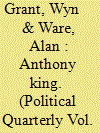

|
|
|
|
|
| Summary/Abstract |
The Department of Government at Essex University provided a favourable environment for the development of Anthony King's work. While his primary interest was the UK, his intellectual interests were far broader in scope and informed by comparative insights. His key work was on political leadership, but he also made crucial contributions on other issues such as ungovernability. He had a particular concern with the quality of government, reflected in the Blunders book he wrote with Ivor Crewe.
|
|
|
|
|
|
|
|
|
|
|
|
|
|
|
|
| 2 |
ID:
130945
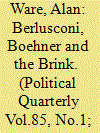

|
|
|
|
|
| Publication |
2014.
|
| Summary/Abstract |
In the early autumn of 2013 large minorities in Italy and the United States fermented crises that badly disrupted the government of the two countries. These cases were widely understood as instances of dysfunction in established democracies that would rarely be replicated elsewhere. However, while all the conditions that generated the crises are unlikely to be evident in other established democracies three important factors that caused the disruptions in the American and Italian political processes are also sources of political conflict in Britain. They are the powers of the second legislative chamber, the weakening links between parties and social groups, and the redrawing of electoral boundaries. All of them present problems for political reform in Britain, and understanding the role they played in the two political crises of 2013 is important for future reform in Britain.
|
|
|
|
|
|
|
|
|
|
|
|
|
|
|
|
| 3 |
ID:
156785
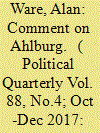

|
|
|
|
|
| Summary/Abstract |
At the heart of my article in 2015, to which Dennis A. Ahlburg is publishing a rejoinder, lay reports and official data exposing a major flaw in British education policy. The data show that, even five years after graduation, about one third of all graduates this century have not been employed in jobs for which a university degree was actually required. Furthermore, projections for student loan repayments indicate that well over one third of the total will never be repaid; since repayment is triggered only when someone's income reaches a level similar to the average for part-time employees (and less than for full-time workers), massive social waste seems apparent.1 This scale of waste is partly due to traditionally high costs of university level teaching when compared with many forms of teaching and methods for developing skills. (Primarily this is because effective teaching at an advanced level, especially of analytic skills, is best undertaken in small groups, and also because it requires close co-ordination with those researching in the relevant fields.) Eventually someone has to pay for that education. In the much smaller higher education sector of the mid-twentieth century the cost was largely borne by the British state. Later a large portion was transferred to students themselves, through introducing tuition fees and abolishing universal maintenance grants, and also to future tax payers when loans are not repaid. From the sole perspective of financial return (my focus in that article), more seems to be being paid by individuals and the state than necessary for servicing the needs of the British labour market.
|
|
|
|
|
|
|
|
|
|
|
|
|
|
|
|
| 4 |
ID:
176081
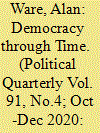

|
|
|
|
|
| Summary/Abstract |
Since the 1980s identities have re‐emerged as a powerful factor shaping support for specific public policies, often doing so at the expense of prioritising the interests of future generations. Outside the United States a major causal factor has been the declining ability of many political parties to mobilise support for themselves and their policies. Consequently, considerations derived from the past can be at the expense of future citizens. This article analyses two major policies separated by a century—Prohibition in the US and Brexit. With both, the enacted policies featured limited previous public discussion about their likely consequences. Moreover, in both cases it was a ‘hard’ version that would be enacted, even though some supporters had favoured more moderate policy options. While not all policies driven by support from particular identities harm future generations, some do. This results from politicians in public utterances previously being insufficiently focussed in detail on the policy’s consequences.
|
|
|
|
|
|
|
|
|
|
|
|
|
|
|
|
| 5 |
ID:
149223
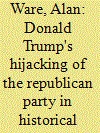

|
|
|
|
|
| Summary/Abstract |
Four aspects of Donald Trump's hijack of the Republican party are examined. First, how he used unconventional techniques, usually associated with some ‘reality’ television programmes, to become the leading candidate in the pre-primary debates. He could thereby develop ‘momentum’ before the primaries began despite his limited support among Republican activists. Second, how his insurgency differed from the party's takeover in 1964 by supporters of Barry Goldwater. Third, how the Republicans have replaced the Democrats since the early 1980s as the party with a less cohesive potential coalition among voters, with the result that internal party relations became more conflictual throughout the period. Finally, that internal conflict has been intensified by two factors in those decades: the prevalence of divided government, which has made it virtually impossible to impose a truly conservative agenda on federal government policy, and the impact of forty years of stagnating real incomes for many middle-income Americans.
|
|
|
|
|
|
|
|
|
|
|
|
|
|
|
|
| 6 |
ID:
107438
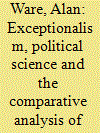

|
|
|
|
|
| Publication |
2011.
|
| Summary/Abstract |
For more than four decades the analysis of party organizations in the European democracies has been completely separated from analyses of American party structures. The first part of this article examines how and why such a separation was to emerge in the aftermath of Duverger's and Epstein's path-breaking original work. It then goes on to outline how an analytic framework might be developed so that more wide-ranging comparative studies of party organizations in democratic regimes can be undertaken in future. Only with such research can the limitations of 'exceptionalist' and 'regionalist' explanations of party structure development and change be overcome.
|
|
|
|
|
|
|
|
|
|
|
|
|
|
|
|
| 7 |
ID:
153301
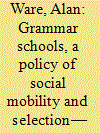

|
|
|
|
|
| Summary/Abstract |
Initially, four plausible reasons for introducing selection in secondary education are examined, three of which are irrelevant to contemporary debates about expanding grammar-school education. These are: first, to ration education in less advanced economies; second, to increase the supply of skilled labour within an expanded national elite; third, as part of a ‘segmented’ system of education. A fourth—increasing upward social mobility—is open to two objections: first, the May government's proposals are so limited as to have little likely impact on mobility and, second, upward mobility in the twentieth century was possible only because of structural change in the British labour market, and that will probably not continue in this century. Finally, it is argued that attempts to select the ‘best’ in any activity or skill are necessarily highly imperfect, and are far less accurate than testing who does and does not meet some minimum level of competence.
|
|
|
|
|
|
|
|
|
|
|
|
|
|
|
|
| 8 |
ID:
141753
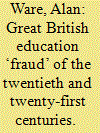

|
|
|
|
|
| Summary/Abstract |
The role played by educational credentials in British labour market recruitment changed radically during the mid-twentieth century. Having higher or better credentials than others became a key determinant in selection for society's best-paid jobs. The resulting race for them has had perverse effects. A large minority of graduates earn no more than non-graduates or are in jobs for which they are ‘overeducated’. In various ways, the incentive to ‘stay ahead’ has prompted large expenditures by families to improve the qualifications a child obtains at school, while there is also now huge demand for postgraduate qualifications. Not only is there resulting social waste but also social injustice; while education was understood previously as a means of breaking down barriers to social mobility, it now has the opposite effect. This article explores the causes of these developments and outlines briefly how a new centre-left agenda for education might be constructed.
|
|
|
|
|
|
|
|
|
|
|
|
|
|
|
|
| 9 |
ID:
141755
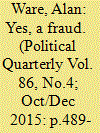

|
|
|
|
|
|
|
|